Atal Bihari Vajpayee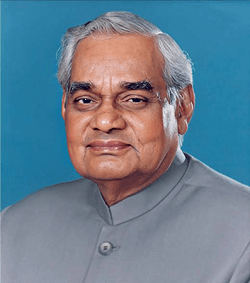
Atal Bihari Vajpayee was born on the 25th of December in 1924 and passed away on August 16, 2018. He was an Indian politician who held the position of 10th Prime Minister of India for three terms: from 1996 for 13 days, to 1998 and 1999 for 13 months, and then from 1999 to 2004 a full time. One of the Bharatiya Janata Party's (BJP) co-founders and a prominent figure, Vajpayee, belonged to the Rashtriya Swayamsevak Sangh, a group of volunteers with Hindu nationalist views. He was the first non-Indian-National-Congress prime minister to hold the position for the entire time. He was also a well-known author and poet. He served in the Indian Parliament for over 50 years, serving ten times in the lower house (the Lok Sabha) and twice in the upper house (the Rajya Sabha). He represented Lucknow in the House of Representatives until stepping down from active service in 2009 owing to health issues. He was one of the original Bharatiya Jana Sangh (BJS) members and served as its president from 1968 to 1972. The Janata Party, which dominated the 1977 general election, was created after the BJS united with several other parties. Vajpayee joined Prime Minister Morarji Desai's cabinet in March 1977 and was appointed Minister of External Affairs. In 1979, he announced his resignation, and the Janata alliance quickly disintegrated. The 1998's Pokhran-II nuclear tests were conducted by India when he served as prime minister. Early Life and EducationVajpayee was born on December 25, 1924, in Gwalior, Madhya Pradesh, into a Hindu Brahmin clan. Krishna Devi and Krishna Bihari Vajpayee were his parents. In the town where they lived, his father was a teacher. His great-grandfather Shyam Lal Vajpayee moved from his ancestral hamlet of Bateshwar in the Agra region of Uttar Pradesh to Morena near Gwalior. Vajpayee attended the Saraswati Shishu Mandir in Gwalior for his formal education. After his father joined as headmaster at the Anglo-Vernacular Middle (AVM) Academy in the Barnagar, Ujjain region, he was accepted the following year. After that, he enrolled in Gwalior's Victoria College (now known as the Maharani Laxmi Bai Government College of Excellence) to pursue a BA in Hindi, English, and Sanskrit. At DAV College in Kanpur, he earned an MA in Political Science to finish his post-graduate studies. Independence MovementHis involvement in activism began in Gwalior with the Arya Kumar Sabha, the movement's youth section, of which he rose to general secretary status in 1944. Earlier in 1939, he also became a swayamsevak, or volunteer, in the Rashtriya Swayamsevak Sangh (RSS). He attended the RSS Officers Training Camp from 1940 to 1944 under the influence of Babasaheb Apte, and in 1947 he became a pracharak (RSS slang for a full-time employee). The partition riots caused him to discontinue his legal studies. He was sent to serve as a vistarak (probationary pracharak) in Uttar Pradesh and soon started writing for Deendayal Upadhyaya's publications, including the daily Swadesh and Veer Arjun as well as the Hindi monthly Rashtradharma and the weekly Panchjanya. By 1942, when he was 16 years old, Vajpayee had actively joined the Rashtriya Swayamsevak Sangh (RSS). Vajpayee and his older brother Prem were detained for 24 days in August 1942 during the Quit India Movement, despite the RSS's decision to abstain. After admitting in writing that, although he was in the throng, he did not participate in the militant activities at Bateshwar. Later on August 27, 1942, he was freed. Vajpayee has referred to the accusation as a false rumour throughout his life, notably after being elected prime minister. Early Political Career (1947-1975)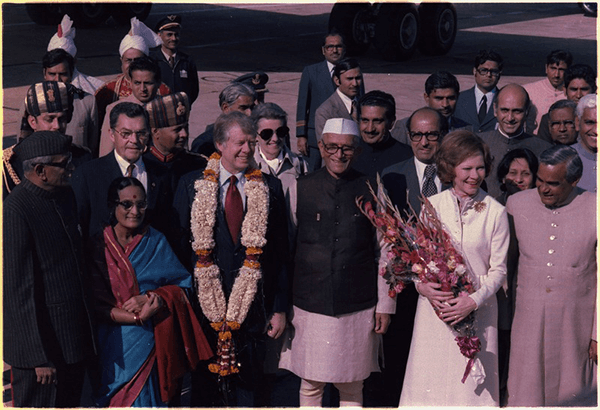
In 1951, the RSS sent Vajpayee and Deendayal Upadhyaya as deputies to work for the newly established Bharatiya Jana Sangh, a Hindu right-wing political group connected to the RSS. He was chosen as the party's national secretary for the Delhi-based Northern region. He quickly became Syama Prasad Mukherjee's assistant and devotee. Vajpayee ran for the Lok Sabha, the Indian Parliament's lower chamber, in the general election of 1957. In Mathura, he was defeated by Raja Mahendra Pratap, but he won in Balrampur. Prime Minister Jawaharlal Nehru was so impressed by Vajpayee's oratory in the Lok Sabha that he projected that he would eventually lead India as prime minister. Vajpayee gained a reputation as Jana Sangh's policies' most persuasive supporter thanks to his oratorical prowess. Deendayal Upadhyaya died, and Vajpayee took over as head of the Jana Sangh. In 1968, he was elected national president of the Jana Sangh, co-leading it with L. K. Advani, Nanaji Deshmukh, Balraj Madhok, and Balraj Madhok. Janata and the BJP (1975-1995)Several opposition figures, including Vajpayee, were detained during the 1975 Internal Emergency by PM Indira Gandhi. Vajpayee was first imprisoned in Bangalore, but after filing an appeal and citing poor health, he was transferred to a hospital in Delhi. Vajpayee instructed the ABVP student activists to unconditionally apologise to Indira Gandhi for their acts of violence and disruption in December 1976. The ABVP student activists disobeyed his command. In 1977, Gandhi lifted the emergency. The Janata Party, which dominated the 1977 general elections, was created by an alliance of parties, including BJS. The alliance's chosen leader, Morarji Desai, was appointed prime minister. In Desai's government, Vajpayee was the minister of international affairs or external affairs. In 1977, Vajpayee made history when he gave the first speech in Hindi to the UN General Assembly while serving as the country's foreign minister. The Janata Party disintegrated in 1979 as a result of the resignations of Desai and Vajpayee. In 1980, the former Bharatiya Jana Sangh members united to create the Bharatiya Janata Party (BJP), with Vajpayee serving as its first president. Following the death of Prime Minister Indira Gandhi by her Sikh bodyguards, the general elections of 1984 were held. While Vajpayee had won the elections in 1977 and 1980 from New Delhi, he moved to his home town Gwalior for the election. At first, Vidya Razdan was expected to run for Congress (I). Instead, on the final day for submitting names, Madhavrao Scindia, a member of the Gwalior noble families, was appointed. Vajpayee was defeated by Scindia after receiving only 29% of the vote. Under Vajpayee, the BJP softened Jana Sangh's Hindu nationalism by highlighting its affiliation with the Janata Party and voicing sympathy for Gandhian Socialism. The change in ideology did not help it succeed; instead, Indira Gandhi's death increased support for Congress and helped it win a resounding electoral victory. Only two seats in parliament were gained by the BJP. Following the BJP's poor result in the election, Vajpayee made an offer to resign as party president, but he remained in the position until 1986. He was briefly the BJP leader in Parliament after being elected from Madhya Pradesh to the Rajya Sabha in 1986. Terms as Prime MinisterFirst Term: May 1997Advani, the president of the BJP, announced that Vajpayee would be the party's candidate for prime minister in the next elections during a BJP meeting in Mumbai in November 1995. According to reports, Vajpayee disagreed with the declaration and said the party was trying to win the election first. In the general election of 1996, the BJP won the most seats in Parliament, thanks in part to the country's increased religious division as a result of the destruction of the Babri Masjid. Shankar Dayal Sharma, the president of India, welcomed Vajpayee to form the government. As India's tenth prime minister, Vajpayee was sworn in. Second Term: 1998-1999The Lok Sabha was dismissed after the two United Front administrations in power between 1996 and 1998 fell, and new elections were conducted. The BJP once more prevailed in the general elections of 1998. The National Democratic Alliance (NDA), which included various political groups, was formed, and Vajpayee was sworn in as prime minister. Except for the Shiv Sena, none of the other parties supported the Hindu-nationalist ideology of the BJP, making the partnership uncomfortable. Vajpayee has received praise for effectively navigating this alliance despite philosophical pressure from the RSS and the hard-line side of the party. Third Term: 1999-2004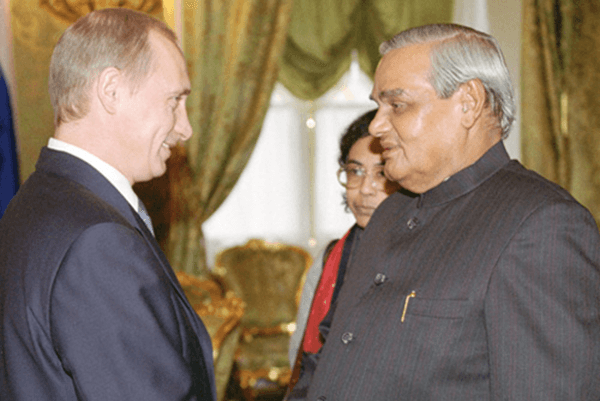
After the Kargil operations, the 1999 national elections were conducted. Out of the 543 seats in the Lok Sabha, the BJP-led NDA won 303, gaining a solid and reliable majority. Vajpayee took his third oath as India's prime minister on October 13, 1999. When five terrorists hijacked Indian Airlines flight IC 814 from Kathmandu to New Delhi in December 1999 and took off towards Taliban-controlled Afghanistan, it caused a national catastrophe. The demands given by the hijackers included the release from custody of known terrorists like Masood Azhar. The administration finally gave in when under pressure. The terrorists travelled to Afghanistan with the then-external affairs minister Jaswant Singh, who traded them for the travellers. The administration pushed through economic changes in the latter half of 2002 and 2003. After these three years of growth below 5%, the nation's GDP increased by an average of over 7% annually from 2003 to 2007. The nation's reputation abroad was enhanced by increased foreign investment, the modernisation of commercial and industrial infrastructures, the creation of jobs, a growing high-tech and IT industry, and urban modernisation and growth. Substantial industrial expansion and good agricultural yields also boosted the economy. The administration of Vajpayee implemented several domestic economic and infrastructure changes, including promoting private enterprise and foreign investment, cutting government waste, promoting research and development, and privatising certain state-owned businesses. The National Highways Development Program and the Pradhan Mantri Gram Sadak Yojana were two of Vajpayee's initiatives. The Sarva Shiksha Abhiyan initiative, started by the Vajpayee administration in 2001, aimed to raise the standard of instruction in middle and high schools. Personal Life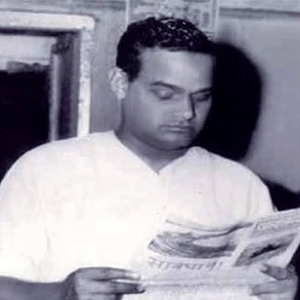
Vajpayee lived a bachelor's life, all of it. He raised Namita Bhattacharya, the daughter of his lifelong friend Rajkumari Kaul and her spouse B. N. Kaul, as a kid. He shared a home with his adopted family. Vajpayee was reputed to like meat and liquor, in contrast to pure Brahmins who abstain from both. In addition to his political ambitions, Atal Bihari Vajpayee was a well-known poet. He published poetry in Hindi. His most notable works are "Amar Aag Hai" and "Kaidi Kaviraj Ki Kundalian", a compilation of poetry he wrote while imprisoned during the emergency of 1975-1977. Regarding the poetry, he published, "Not an exordium of defeat, but a declaration of battle is what my poetry is. But the battling warrior's will to prevail, not the vanquished soldier's cadence of despair. It is the rousing yell of victory rather than the dejected voice of defeat." Awards and Achievements
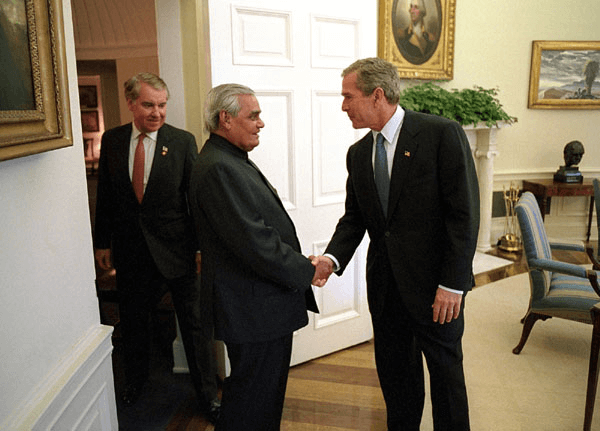
As a result of his selfless service to the nation, which he refers to as his first and only passion, Shri Atal Bihari Vajpayee was awarded the Bharat Ratna in 2014-India's highest civilian honour. Over 50 years of his life were spent serving the community and the country. In 1994, he was recognised as the "Best Parliamentarian." In addition to establishing himself as a preeminent national leader, Shri Atal Bihari Vajpayee was a learned politician and devoted social worker. His broad range of abilities gave him a complex personality. His artistic output reflects his dedication to nationalism, as he attempted to express the desires of the general populace. DeathIn 2009, Vajpayee suffered a stroke that left him unable to speak. His health had been a significant worry; according to accounts, he depended on a wheelchair and had trouble recognising people. He also suffered from long-term diabetes and dementia. Except for testing at the All India Institutes of Medical Sciences, he had not participated in any public events and had not left the house in a long time. Following a kidney illness, Vajpayee was critically ill when he was brought to AIIMS on June 11. On August 16, 2018, at 5:05 IST, he was formally pronounced dead. He was 93 years old. Some stories assert that he passed away the day before. On August 17, Vajpayee's body was brought to the Bharatiya Janata Party offices and wrapped with the Indian flag. Party members paid their respects there till 1 pm. His pyre was lighted by his foster daughter Namita Kaul Bhattacharya at Rashtriya Smriti Sthal near Raj Ghat later that afternoon at 4 pm, during Vajpayee's cremation with full state honours. India was devastated at Vajpayee's passing, as hundreds of condolences flooded social media. Thousands of people attended his funeral procession to pay their respects. The federal government of India declared a seven-day national day of mourning. During this time, the national flag was at half-staff. LegacyIn 2014, the Narendra Modi administration stated that Vajpayee's birthday, December 25, would be celebrated as Good Governance Day. The world's longest tunnel, the Atal Tunnel in Rohtang, Himachal Pradesh, on the Leh-Manali Highway, was named after Atal Bihari Vajpayee. Atal Setu, the third-longest cable-stayed overpass in India crossing the Mandovi River, was given his name. The title of Naya Raipur was changed to Atal Nagar by the Chhattisgarh government.
Next TopicBenjamin Franklin
|
 For Videos Join Our Youtube Channel: Join Now
For Videos Join Our Youtube Channel: Join Now
Feedback
- Send your Feedback to [email protected]
Help Others, Please Share










